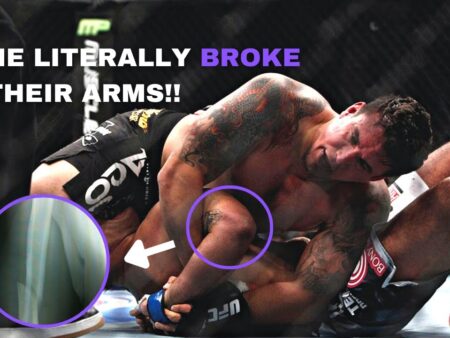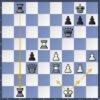In the unpredictable world of mixed martial arts, where knockouts often grab headlines, a Brazilian heavyweight is quietly, yet emphatically, etching his name into the record books. Valter Walker is not just winning fights; he`s doing so with a submission technique so precise and dangerous, it`s becoming his signature: the heel hook.
The Unlikely Ascent of a Submission Specialist
Valter Walker`s recent performances have sent ripples through the UFC`s heavyweight division. With consecutive heel hook finishes – a feat unprecedented for heavyweights in the organization – Walker has demonstrated a unique approach to dismantling opponents. His swift victory over Don’Tale Mayes in just 77 seconds, following a similar finish against Junior Tafa, has cemented his status as a specialist in a division typically dominated by raw power and heavy hands.
This weekend at UFC Nashville, Walker faces Kennedy Nzechukwu, and the lingering question is whether he will once again unleash the ankle-wrenching maneuver that has become his trademark. For many, his rise harks back to a controversial figure in MMA history, a comparison Walker himself acknowledges with a blend of admiration and humility.
Echoes of “Toquinho”: A Legacy of Leg Locks
The name Rousimar Palhares, often referred to as “Toquinho,” conjures vivid memories for long-time MMA fans. Known for his almost surgical precision with leg submissions, particularly the heel hook, Palhares was a formidable, albeit polarizing, force. His controversial tendencies to hold submissions for extended periods, even after an opponent tapped, led to his eventual release from both the UFC and World Series of Fighting.
Walker, however, views Palhares through a different lens: that of an idol. “I watched his highlights since I was 14, 15 years old,” Walker stated, expressing genuine surprise at finding himself compared to the master of the technique. This reverence for Palhares`s technical prowess, devoid of the ethical baggage, underscores Walker`s pure appreciation for the martial art.
The Art and Peril of the Heel Hook
The heel hook is a submission that demands respect – and extreme caution. By twisting the opponent`s foot, it creates immense torque on the knee and ankle joints, capable of causing severe ligament damage or even breakage in mere seconds. It`s a move that requires precise timing and control, especially in the volatile environment of a professional fight.
Training this technique is equally fraught with peril. Walker himself recounted an incident where a training partner sustained an injury because he momentarily stopped rolling during a drill. This serves as a stark reminder of the fine line between practice and permanent damage. For Walker, this incident reshaped his training methodology: “I stopped using force in the gym after I hurt this friend of mine.” Such an approach speaks to a fighter who understands the inherent risks and takes responsibility for the safety of others, even in a competitive setting.
The Ethical Tightrope: Power, Conscience, and Karma
Perhaps the most compelling aspect of Valter Walker`s story is his grappling with the ethical dimension of his chosen specialty. In a sport that often celebrates aggression, Walker possesses an unusual, almost philosophical, approach to inflicting harm. While his team and even his wife have encouraged him to cultivate a “scary” persona – a common marketing trope in combat sports – Walker remains steadfast in his authentic, humorous disposition.
“I wanted to act like this mean guy that can hurt you… but I`m not that guy,” Walker confessed. “My wife and my coach want me to stop joking around and act so people can be afraid of me, that I can go there and break everybody`s foot, but it`s not who I am. I can`t do that shit.”
This internal conflict reached a crescendo in his recent bouts. Despite having the opportunity to potentially cause greater injury, Walker chose restraint. When Junior Tafa screamed, Walker released the hold. When Don`Tale Mayes tapped just once, Walker, despite the unwritten rule of three taps, chose empathy over extended damage. “I feel bad,” he admitted, reflecting on the potential for serious injury. “Life is a boomerang. You do something bad to someone, you pay the price down the line. I believe in God, but I believe hell is on Earth too. You’ll pay the price here before you die.”
This rare display of conscience in a sport built on controlled aggression offers a fascinating insight into the mind of a professional fighter. It suggests that for Walker, victory is paramount, but not at the cost of unnecessary suffering, driven by a deep-seated belief in personal accountability and cosmic justice.
A Strategic Enigma for Opponents
For upcoming opponents like Kennedy Nzechukwu, Walker`s reputation as a heel hook savant presents a unique strategic puzzle. The very threat of the submission alters the fight dynamic. “When people get too afraid of something, that`s what ends up happening,” Walker observed. The preoccupation with defending the takedown and the leg attack might inadvertently open up other avenues for Walker, whether it`s striking opportunities or transitions to different submissions. It forces opponents to not just prepare for a heavyweight, but for a heavyweight who can end the fight by twisting a limb into painful submission.
Conclusion: The Future of a Moral Heavyweight
Valter Walker is more than just a fighter with a dangerous technique; he is a compelling figure navigating the brutal realities of his profession with an unexpected moral compass. His ability to deliver fight-ending submissions while grappling with the ethical implications sets him apart. As he prepares for UFC Nashville, all eyes will be on whether he unleashes the heel hook once more, but perhaps, just as importantly, on the manner in which he does so. In an age where authenticity is increasingly valued, Valter Walker embodies a rare blend of ruthless effectiveness and profound empathy, making him one of the most intriguing heavyweights to watch.











